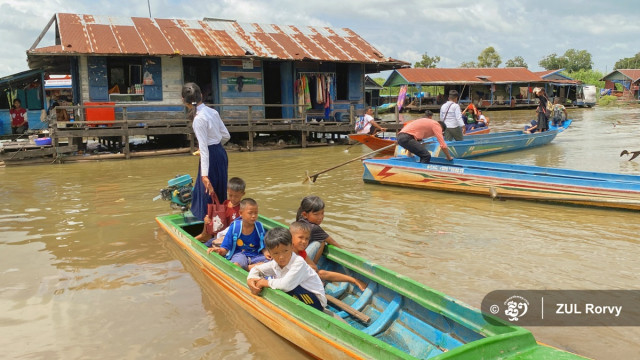Floating School in Kbal Taol Village Hopes for Donations for Repairs

- By Zul Rorvy
- July 23, 2023 5:00 PM
Battambang Province — During every rainy season, people who live in the floating village of Kbal Taol on the Tonle Sap Lake must relocate to safer areas.
This means that the children of the village situated in Ek Phnom district in Battambang province stop going to the school on shore whenever the Tonle Sap lake, which is the largest freshwater lake in Southeast Asia, reaches high levels.
While offshore, the children attend the floating primary school in Kbal Toal. But, as school Director Teav Piseth recently told ThmeyThmey’s journalist Zul Rorvy when he visited the school at the floating village, the facility could do with some repair works.
_1690102224.png)
Zul Rorvy: The school was recently renovated and it now looks great. When was this floating school built?
Teav Piseth: The school was constructed in 1996 by one organisation. However, due to insufficient maintenance, the school was in poor condition by 2013. In 2023, an organisation finally came to help with the repairs. As you can see here, the floating structure is divided into two rooms.
Zul Rorvy: Why is there a need to switch schools in-between seasons? For the students to attend at times the land-based school and the floating school?
Teav Piseth: The main reason behind setting up this school is to make it possible for the students to stay involved in their studies despite the height of the lake during the rainy season, which runs from mid-July to December. Our students will remain temporarily suspended if we don’t have a mobile school to hold classes through that period. So, as head of the school, it is critical for me to have this school repaired.
Zul Rorvy: How many students can this floating school accommodate?
Teav Piseth: We’ve got two classrooms. A room can hold between 50 and 60 students at a time. We have to divide the study into two or three sessions per day due to our lack of available space. When the sessions are further divided, the time for each session also has to be reduced.
Zul Rorvy: So, is this school lacking any materials?
Teav Piseth: The organisation has provided 90 percent of the funding. However, the roof is still in need of repairs because of leakage due to an incident. Plus, we also need handrails around the outside areas to prevent students from slipping into the water, as well as a few more paint jobs. In spite of renovation, the school still lacks two classrooms.
Zul Rorvy: How about the amenities inside the rooms?
Teav Piseth: We simply transport the classroom equipment from our land-based school here. The second room is a bit smaller because we need to leave some space to install a bathroom. With limited budget, our immediate response is to install and repair the zinc roof before jumping on making the handrail and doing paint jobs. I, as the school director, will be happy to receive any kind of aid and donations. We are glad to see humanitarians coming to help our children at this educational facility.
Written in Khmer for ThmeyThmey News, the story was translated by Luy Sirey Reaksa for Cambodianess.















